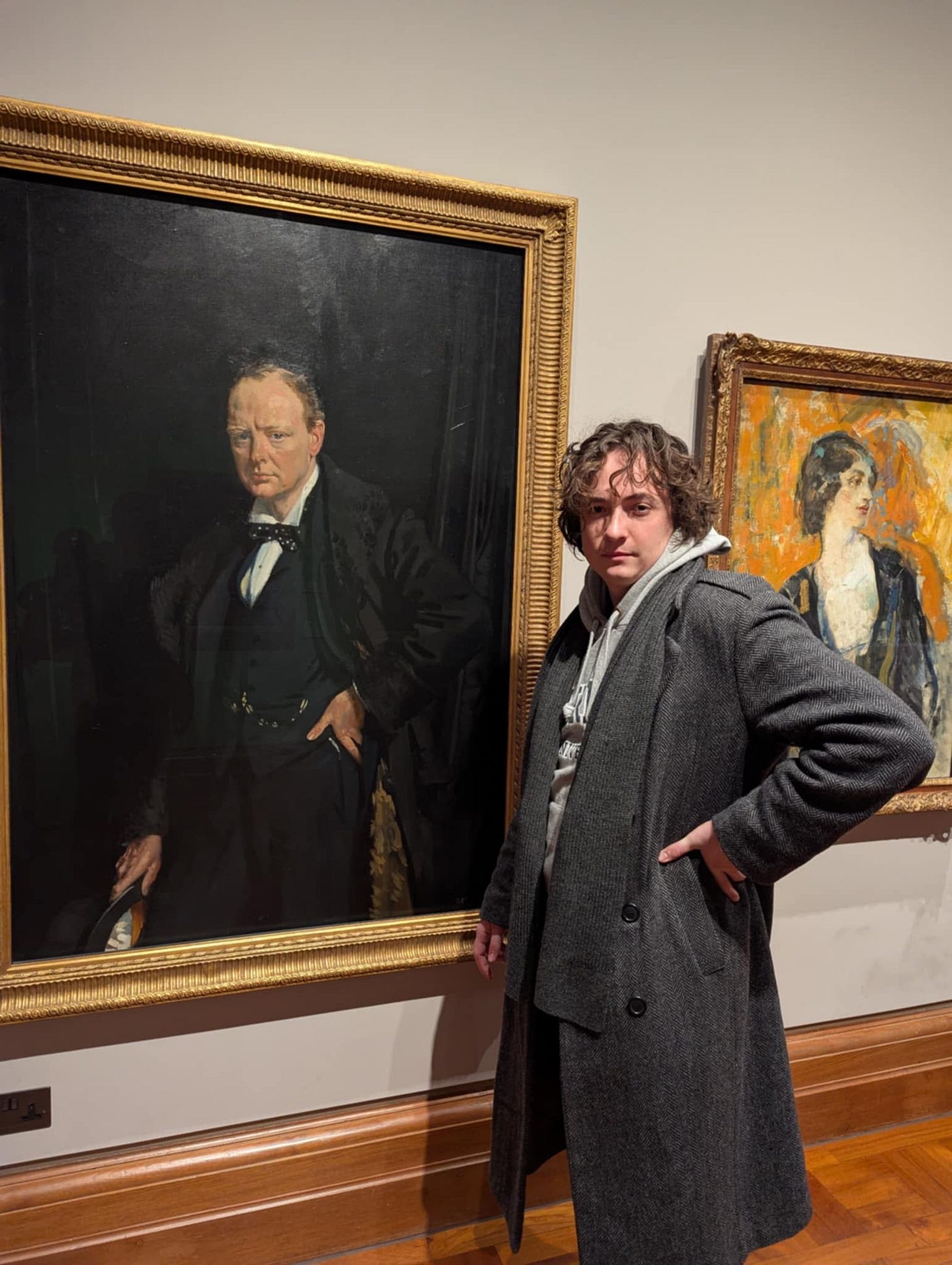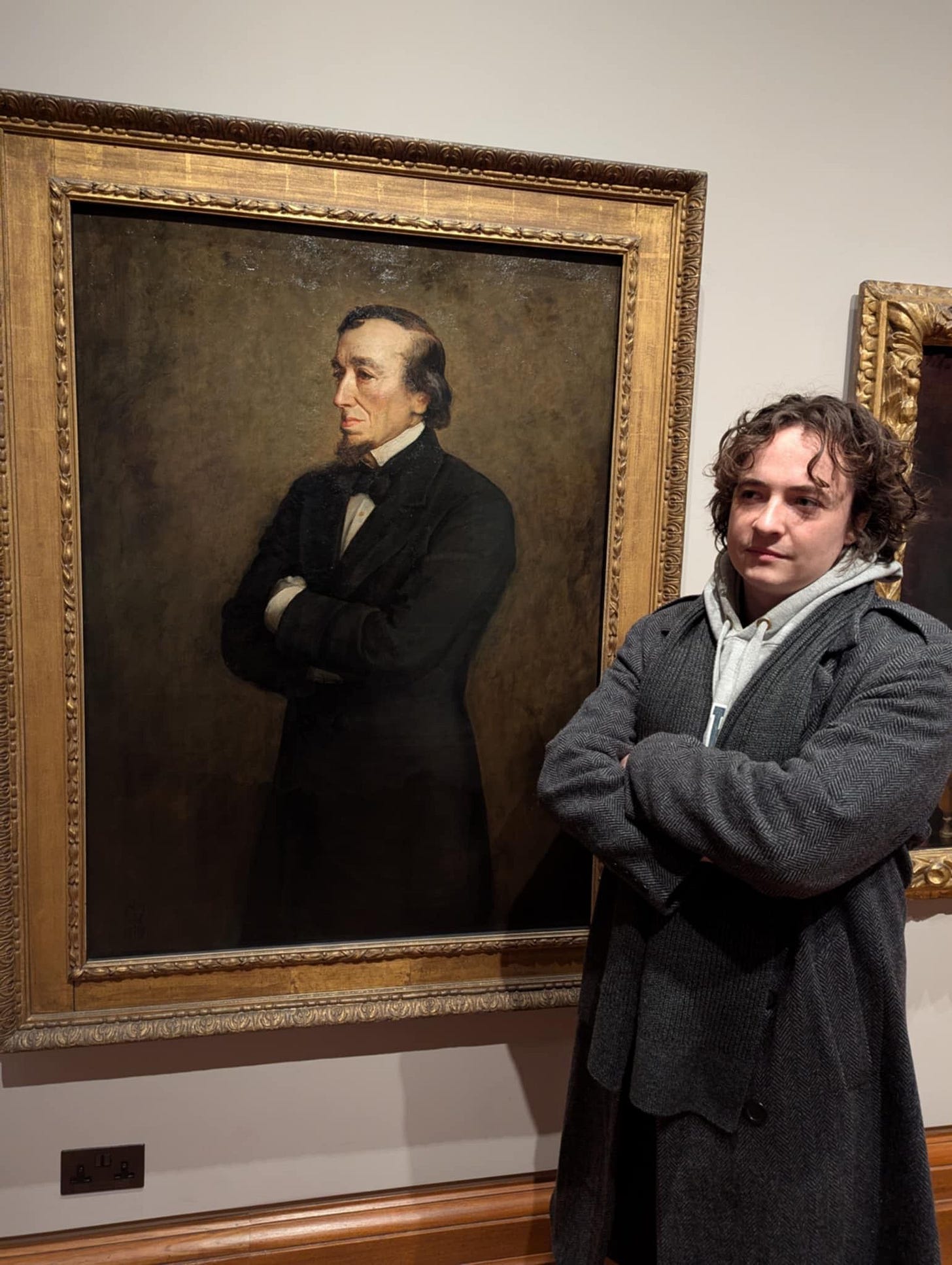“But they’re like fusty Tory old Great Man histories!” It is apparently unclear to my interlocutor what draws me, or my hundreds of thousands of fellow readers, to books with titles like Napoleon The Great and Churchill: Walking with Destiny, but their author, historian Andrew Roberts, understands perfectly. We want to live in a world where greatness is possible. We want to read of “epic[s] whose splendour would draw the attention of posterity for centuries to come”. And we want them, ideally, from a historian who winces for a full two minutes when asked “The newest thing I like? Oh, god. … Is there an ‘app’ I use? Is there a gizmo of any kind? … You’ve got me there. It’s a great question! I literally can’t think of anything, anything post 1970 that I’ve liked much.” (His first childhood memory is the moon landing, 1969.)
Roberts asks, courteously, if it wouldn’t be too inconvenient to meet in the Lords, “this building where every brick exudes history.” We stroll from the cloak room to an almost comically appropriate desk: in the Royal Gallery, between forty-five-foot murals of Trafalgar and Waterloo. On the way Roberts supplies me with interesting facts about every statue, shield and panel that we pass, and swaps Shakespeare with one or two nearby lords. He is refreshed, having just come from one of the siestas he has taken “invariably” since his twenties. Westminster Palace does provide an upstairs room for resting, but napping peers are, you might have foreseen, vulnerable to rude awakenings by a certain quite loud bell.
Roberts introduced on Goalhanger’s We Have Ways of Making You Talk as “history royalty, one of the biggest names in the game.” He is the Roger and Martha Mertz Visiting Research Fellow at Stanford University and a Lehrman Institute Distinguished Lecturer in the New York Historical Society. He has won more awards than could be recounted here and delivered the White House Lecture. In 2022, for his contributions to history, he was created Lord Roberts of Belgravia. His wife likes to quip that his life’s progress has been from drinking and climbing buildings to drinking and climbing social ladders.
If he no longer taxis between four parties a night, the old exuberance is still manifest, now concentrated on his work. He arises at four-thirty “every morning. I bounce out of bed. Just can’t wait to start the day.” It is straight to work on the new books. The next will be on Napoleon’s marshals. The one after that will be a life of Disraeli, which won’t much complicate the seating plan for a dinner party of his major subjects. Napoleon and George III are already at opposite ends of the table, given Hanover, and it’s pretty clear which you to place Dizzy on. He thought himself Byronic, Byron loved Napoleon. Not to mention what moral George III would think of “a Prime Minister who earlier in his life had been in essentially a threesome with the Lord Chancellor.” Affable Churchill could fit anywhere. Roberts himself, though inclined as a “tremendous snob” by king or emperor, would ultimately have to position himself amid the cigar smoke.
“I’m afraid it always just comes back to Winston Churchill. It’s impossible not to for me, I’m afraid.” After writing about Churchill for well over three decades, Roberts published his biography in 2018. It was, according to the National Book Review “widely praised as the best single-volume biography of Winston Churchill ever written”. It is also a tear-jerker: I will say that I cried six times reading it, and Roberts got emotional writing it: “Yes. Oh absolutely yes. No, as Churchill was dying, I was crying.” Charming moments occur when, for instance, he footnotes the mention of a small flag placed on Churchill’s car with “which is now in the author’s possession.” On my way out I pass the Churchill statue in Parliament square, on a bronze cast of which Roberts squandered his grandfather’s inheritance.
We discuss the famous Churchillian call for youthful action – “Twenty to twenty-five! These are the years!”. I ask where an ambitious youth might declare his courage these days. Roberts points out, gently but firmly, that I’m not exactly volunteering in Ukraine. Zelensky is a singular contemporary Churchillian: “That moment when he stays in Kyiv.”
When he himself was twenty, Roberts was studying history at Cambridge, despite having been expelled from school. “I spent the three years in a sort of nirvana, as far as I was concerned it was pure pleasure from beginning to end, one long Brideshead. Obviously I know there must have been plenty of days that were pretty shitty but I literally can’t remember any of them.” After Cambridge he spent two years working for “very nice people” at a bank until he “discovered that I was functionally innumerate and chucked it.” Twenty-five was the age he commenced his first book.
At that time he supplemented his history work with journalism. You could get a pound a word in the late eighties, so if you worked hard you could earn your living writing journalism in the mornings, then spend the afternoon writing books. And researching them. Roberts never uses research assistants: “why on earth would you allow anyone else to do the most fun bit?”
Now, at sixty-one, he is still writing. But the writing is now paired with politics. He comes to the Palace after his morning work on Mondays, Tuesdays, and Wednesdays, to work from lunch to dinner. When we meet he is preparing to debate the King’s Speech, but keen to share a recent success. Advancing a motion to move Byron’s statue from Park Lane’s dual carriageway to a Hyde Park arbor, “I made a joke. Would you like to hear my joke? I said the present positioning was ‘mad, bad and dangerous to show’! Got a very good laugh from their lordships. I think I went a bit too far when I took a little bow. I shouldn’t have done that, that was one step too far I think, but anyway there we are.”
Under this present balance, his life is “just perfect… I’m doing the job I love, I’m married to the woman I love, I’ve got a wonderful sort of front-row seat to great national occasions. … If I won the lottery tomorrow and won a hundred million pounds I’d still write books. I’d still write exactly the same books as I’m writing at the moment in fact. … These are tremendous honours, wonderful privileges to have. In fact I’m being so hubristic that I’m sure that as soon as this interviews published something absolutely awful is going to happen to me. I’m a great believer in that sense of angst, you know.”
By the way, were we to have a new statue, it should be of Queen Elizabeth II. The fourth plinth in Trafalgar Square isn’t good enough, “frankly.” Also it should be representational, not one of these new ones where “you don’t know what they’re about.” Or the ones like Mary Wollstonecraft’s where “they don’t actually look like her. Call me old fashioned, who doesn’t have many new things in his life, but I think that statues should look like people. And if possible, men should be wearing togas.”
He has no desire to be a great figure of history himself, and is happy writing about them. “Nobody fears me! I’m a writer with no power whatsoever. I’d hate to be feared.” He would also hate to be stuck in a toga. For one thing it makes it hard to climb out the window if Napoleon bursts into the chamber and launches the Brumaire coup. For another it takes you too far back in time. He meets the obligatory time-travel question with a surprising pragmatism. While it’s true that you must go before television to reach the best years, you must not go further than antibiotics. “Can you imagine Boswell’s pain? We all love the eighteenth century, but he catches the clap and the pain is just absolutely appalling.”
Which allows me to ask, as I have wished to, how sex comes into all this greatness and power. It struck me Roberts’ subjects, particularly Churchill and Napoleon, were surprisingly continent. “Yes. You also get that with Hitler. I’d love to know if Hitler actually had sex with Eva Braun very much. But no, sex does very much take very much second place in these lives. That’s another really great reason not to be a great leader, isn’t it!”







Superb
This was very enjoyable. Well done.